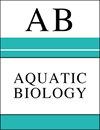温度和性类固醇对大鲵性别比、生长和生长相关基因表达的影响
IF 0.8
4区 生物学
Q3 MARINE & FRESHWATER BIOLOGY
引用次数: 12
摘要
由于其适口性和营养价值,大鲵是养殖最多的两栖动物之一。在这个水生动物和陆生动物之间的过渡群体中,温度和性激素对性比例和生长的影响尚不完全清楚。本研究量化了大鲵的性别二态性,雄成虫比雌成虫大30%左右,并首次确定了雌雄分化的起始时间为孵化后98天。死亡率随温度升高而显著增加,从20℃时的9.4%增加到28℃时的40.6%。温度≥30°C时,死亡率为100%。28°C时,雄性比例为66.1%,显著高于对照组(p < 0.05)。在25 ~ 1000 μg l−1的浓度范围内,17α雌二醇诱导幼虫雌性化,雌性偏向率为81 ~ 100%。然而,暴露于浓度为50 μg l - 1和100 μg l - 1的17α-甲基睾酮的幼虫未观察到性别偏向。此外,不同温度下的生长特征显示,28℃抑制生长,24℃促进生长,这反映了生长相关基因(GH、GHR和IGF-1)的表达谱。性类固醇17β雌二醇和17α-甲基睾酮显著抑制生长(p < 0.05)。结果表明,水温和性激素对大鲵性腺的分化和生长起重要作用。本文章由计算机程序翻译,如有差异,请以英文原文为准。
Effects of temperature and sex steroids on sex ratio, growth, and growth-related gene expression in the Chinese giant salamander Andrias davidianus
Andrias davidianus is one of most farmed amphibians owing to its palatability and nutritional value. In this transitional group between aquatic and terrestrial animals the effects of temperature and sex hormones on sex ratio and growth are not fully understood. Here, we quantified the sex dimorphism of A. davidianus growth with adult males approximately 30% larger than females, and for the first time determined the time of initiation of sex differentiation to be ~98 days post-hatching (dph). Mortality increased significantly with increased temperature, from 9.4% at 20°C to 40.6% at 28°C. At temperatures ≥30°C we observed 100% mortality. The proportion of males was 66.1% at 28°C, significantly higher than in the control group (p < 0.05). 17αestradiol induced larval feminization and produced female bias of 81−100% at concentrations from 25 μg l−1 to 1000 μg l−1. However, sex bias was not observed in larvae exposed to 17α-methyltestosterone at concentrations of 50 μg l−1 and 100 μg l−1. Additionally, growth characteristics at different temperatures showed that 28°C inhibited growth and 24°C promoted growth, reflecting the expression profile of growth-related genes (GH, GHR, and IGF-1). Sex steroids including 17βestradiol and 17α-methyltestosterone significantly inhibited growth (p < 0.05). The results suggest that water temperature and sex steroids play a vital role in gonad differentiation and growth of A. davidianus.
求助全文
通过发布文献求助,成功后即可免费获取论文全文。
去求助
来源期刊

Aquatic Biology
生物-海洋与淡水生物学
CiteScore
2.70
自引率
0.00%
发文量
7
审稿时长
3 months
期刊介绍:
AB publishes rigorously refereed and carefully selected Feature Articles, Research Articles, Reviews and Notes, as well as Comments/Reply Comments (for details see MEPS 228:1), Theme Sections, Opinion Pieces (previously called ''As I See It'') (for details consult the Guidelines for Authors) concerned with the biology, physiology, biochemistry and genetics (including the ’omics‘) of all aquatic organisms under laboratory and field conditions, and at all levels of organisation and investigation. Areas covered include:
-Biological aspects of biota: Evolution and speciation; life histories; biodiversity, biogeography and phylogeography; population genetics; biological connectedness between marine and freshwater biota; paleobiology of aquatic environments; invasive species.
-Biochemical and physiological aspects of aquatic life; synthesis and conversion of organic matter (mechanisms of auto- and heterotrophy, digestion, respiration, nutrition); thermo-, ion, osmo- and volume-regulation; stress and stress resistance; metabolism and energy budgets; non-genetic and genetic adaptation.
-Species interactions: Environment–organism and organism–organism interrelationships; predation: defenses (physical and chemical); symbioses.
-Molecular biology of aquatic life.
-Behavior: Orientation in space and time; migrations; feeding and reproductive behavior; agonistic behavior.
-Toxicology and water-quality effects on organisms; anthropogenic impacts on aquatic biota (e.g. pollution, fisheries); stream regulation and restoration.
-Theoretical biology: mathematical modelling of biological processes and species interactions.
-Methodology and equipment employed in aquatic biological research; underwater exploration and experimentation.
-Exploitation of aquatic biota: Fisheries; cultivation of aquatic organisms: use, management, protection and conservation of living aquatic resources.
-Reproduction and development in marine, brackish and freshwater organisms
 求助内容:
求助内容: 应助结果提醒方式:
应助结果提醒方式:


